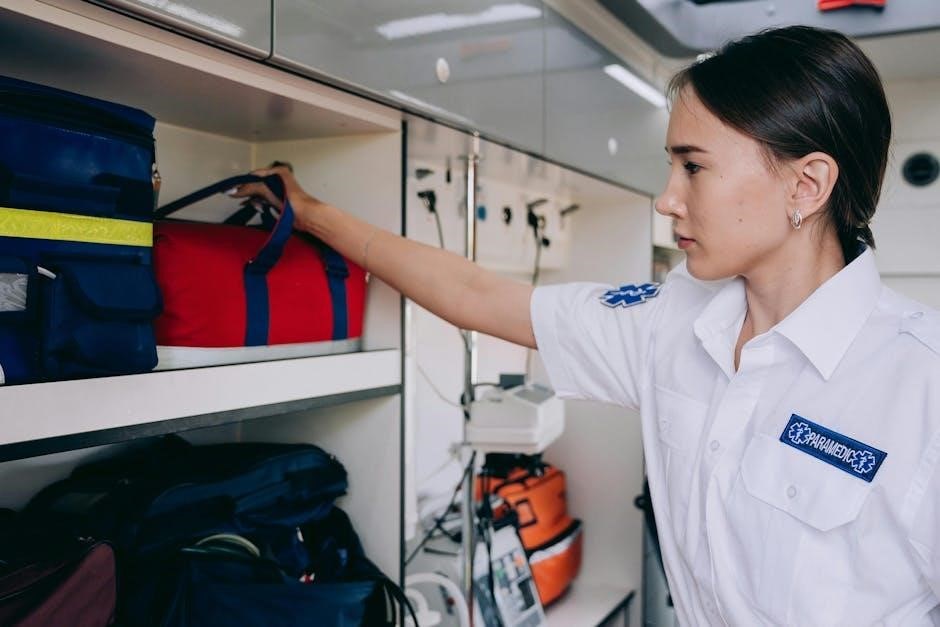First aid psychiatry is an emerging field addressing mental health crises, offering immediate support and connecting individuals to professional care. It plays a crucial role in stabilizing conditions like acute psychosis or severe mood disorders. The approach is both preventive and therapeutic, ensuring timely intervention to prevent escalation. This section introduces the concept, highlighting its significance and application in various settings, including military and emergency scenarios. Resources like the First Aid Psychiatry PDF guide provide essential tools for understanding and implementing these strategies effectively.
1.1 What is First Aid Psychiatry?
First aid psychiatry is a complementary approach providing immediate support during mental health crises. It focuses on stabilizing conditions like acute psychosis or severe mood disorders, aiming to prevent escalation. This practice connects individuals to professional care, emphasizing timely intervention and emotional stabilization. The First Aid Psychiatry PDF guide outlines essential strategies for non-specialists to deliver effective psychological support in emergency settings.
1.2 Historical Development of First Aid Psychiatry
First aid psychiatry emerged as a response to mental health crises, evolving from military psychiatry. It has historically focused on addressing acute conditions like combat stress. Over time, its scope expanded to include civilian emergencies, emphasizing immediate stabilization and connection to care. The field remains a developing area, with resources like the First Aid Psychiatry PDF guiding its practical application and recognition in modern healthcare settings.

Key Concepts in First Aid Psychiatry
First aid psychiatry involves providing immediate mental health support, facilitating professional connections, and using key evidence-based practices to stabilize acute conditions effectively.
2.1 Core Principles of First Aid Psychiatry
Core principles include stabilization, safety, empathy, and connection to professional care. Techniques focus on assessment, reassurance, and evidence-based interventions to manage acute mental health crises effectively.
2.2 Goals and Objectives of First Aid Psychiatry
Goals focus on providing immediate support, stabilizing mental health crises, and facilitating timely professional intervention. Objectives include enhancing resilience, reducing distress, and ensuring a safe environment for individuals in acute need.
Psychological First Aid
Psychological First Aid (PFA) is a strategy to promote resilience and well-being during crises. It involves providing comfort, reducing distress, and connecting individuals to supportive resources.
3.1 Definition and Scope of Psychological First Aid
Psychological First Aid (PFA) is an evidence-based strategy to promote resilience and well-being during crises. It involves providing comfort, reducing distress, and connecting individuals to supportive resources. PFA is designed to address emotional and psychological needs in the immediate aftermath of traumatic events. It is non-intrusive, focusing on assessment, active listening, and empowerment. The scope includes stabilizing individuals, preventing long-term psychological harm, and fostering recovery in various settings, such as disasters or emergencies.
3.2 Techniques and Strategies for Psychological First Aid
Psychological First Aid employs techniques like active listening, empathy, and reassurance to stabilize individuals in crisis. Strategies include assessing needs, providing comfort, and connecting to resources. It emphasizes creating a safe environment, reducing stress, and fostering resilience. Techniques are non-intrusive, focusing on empowerment and practical support. These methods are detailed in resources like the First Aid Psychiatry PDF, offering evidence-based approaches for effective crisis intervention.
Military Psychiatry and First Aid
Military psychiatry addresses mental health challenges in armed forces, incorporating first aid strategies to manage combat-related stress and trauma. It focuses on early intervention, resilience, and rapid stabilization, ensuring soldiers receive timely support. The First Aid Psychiatry PDF highlights these approaches, emphasizing their role in maintaining military readiness and reducing long-term psychological impacts.
4.1 The Role of Psychiatry in Military Settings
In military settings, psychiatry plays a critical role in maintaining personnel mental health, addressing combat stress, trauma, and anxiety. Psychiatrists assess conditions, provide early interventions, and facilitate resilience. The First Aid Psychiatry PDF underscores the importance of timely psychological support to prevent escalation and ensure operational readiness. These strategies aim to enhance overall well-being and reduce long-term psychological impacts on military personnel.
4.2 Unique Challenges in Military Psychiatry
Military psychiatry faces unique challenges, including combat-related trauma, acute stress, and anxiety. The dual role of psychiatrists to treat mental health issues while ensuring military readiness adds complexity. The First Aid Psychiatry PDF highlights the need for rapid, effective interventions in high-stress environments. Addressing these challenges requires specialized training and resources to support soldiers’ mental well-being effectively.
Crisis Intervention and Management
Crisis intervention is a critical component of first aid psychiatry, focusing on stabilizing individuals during mental health emergencies. It involves assessing risks and implementing immediate strategies to de-escalate situations, ensuring safety and providing emotional support. Effective techniques include active listening, empathy, and connecting individuals to professional care, all of which are essential for managing acute psychological crises effectively.
5.1 Principles of Crisis Intervention
The principles of crisis intervention in first aid psychiatry emphasize prompt action, risk assessment, and non-verbal communication. They focus on empathetic engagement, establishing trust, and ensuring safety. Techniques include active listening, de-escalation strategies, and creating a calming environment. These approaches aim to stabilize the individual, reduce agitation, and prevent harm, ensuring a humane and effective response to mental health emergencies.
5.2 Assessing and Managing Crises
Assessing and managing crises involves evaluating the mental status, determining severity, and prioritizing interventions. Immediate safety, emotional stabilization, and timely support are critical. Techniques include de-escalation, active listening, and connecting individuals to professional help. The First Aid Psychiatry PDF provides practical guidelines for effectively handling such emergencies, ensuring appropriate care and referrals.
Common Psychiatric Disorders and Emergency Management
Common psychiatric emergencies include acute psychosis, severe depression, and manic episodes. Immediate interventions focus on stabilization, safety, and symptom management. The First Aid Psychiatry PDF provides practical strategies for assessing and addressing these critical conditions effectively.
6.1 Overview of Common Psychiatric Emergencies
Common psychiatric emergencies include acute psychosis, severe mood disorders, and suicidal ideation. These conditions often require immediate intervention to ensure patient and bystander safety. The First Aid Psychiatry PDF outlines key strategies for recognizing and managing these crises. Early identification of symptoms such as hallucinations, delusions, or extreme emotional distress is critical for effective emergency response. Prompt action can prevent escalation and improve outcomes.
6.2 Diagnosis and Initial Management
Diagnosis in psychiatric emergencies involves rapid assessment of mental status, risk factors, and underlying causes. Initial management focuses on ensuring patient and bystander safety, de-escalation techniques, and stabilizing acute symptoms. Pharmacological interventions, such as sedatives or antipsychotics, may be necessary. The First Aid Psychiatry PDF provides structured approaches for evaluating and managing these situations effectively, emphasizing timely intervention to prevent complications.
Pharmacological and Non-Pharmacological Interventions
Pharmacological interventions, such as antipsychotics and sedatives, are used to stabilize acute symptoms. Non-pharmacological approaches, including de-escalation techniques and talk therapy, complement these treatments. The First Aid Psychiatry PDF outlines evidence-based strategies for combining these methods effectively in emergencies.
7.1 Pharmacological Interventions in Emergencies
Pharmacological interventions in psychiatric emergencies focus on stabilizing acute symptoms. Antipsychotics, benzodiazepines, and mood stabilizers are commonly used to manage agitation, aggression, or psychosis. These medications are administered orally or intramuscularly, with dosages tailored to the severity of symptoms. The First Aid Psychiatry PDF emphasizes the importance of evidence-based protocols and monitoring for side effects to ensure safe and effective treatment. Proper use of these drugs can prevent escalation and improve patient outcomes.
7.2 Non-Pharmacological Approaches
Non-pharmacological interventions emphasize de-escalation techniques, environmental calming, and psychological support. These methods focus on reducing agitation and anxiety without medication, promoting patient safety and comfort. Strategies include active listening, emotional validation, and creating a serene atmosphere. The First Aid Psychiatry PDF highlights these approaches as essential for managing crises effectively, ensuring patient-centered care and preventing symptom escalation in emergencies.
Legal and Ethical Considerations
Legal and ethical considerations in first aid psychiatry involve patient confidentiality, informed consent, and adherence to mental health laws. These principles ensure respectful and lawful care.
8.1 Legal Issues in Emergency Psychiatry
Legal issues in emergency psychiatry often revolve around patient rights, involuntary commitment laws, and duty to protect. These matters require balancing individual autonomy with public safety. The First Aid Psychiatry PDF highlights the importance of understanding local regulations to avoid legal pitfalls. Proper documentation and adherence to ethical standards are critical to navigating these complex situations effectively.
8.2 Ethical Dilemmas and Confidentiality
Ethical dilemmas in emergency psychiatry often arise from confidentiality concerns, with professionals needing to protect patient privacy while ensuring safety. The First Aid Psychiatry PDF emphasizes the importance of maintaining trust and respecting patient autonomy. Confidentiality must sometimes be breached to prevent harm, requiring careful judgment. These challenges demand a deep understanding of ethical principles and their practical application in high-stakes situations.

Integration of Multimedia Elements in Education
Multimedia elements enhance learning in first aid psychiatry through interactive eBooks, gamified content, and simulations. These tools improve engagement and retention, making complex concepts accessible. The First Aid Psychiatry PDF and platforms like AccessNeurology offer multimedia resources for immersive education.
9.1 Role of Interactive and Gamified eBooks
Interactive and gamified eBooks play a vital role in modern education, enhancing engagement through quizzes, simulations, and real-life case studies. These tools make learning dynamic, improving retention and understanding. The First Aid Psychiatry PDF exemplifies this trend, offering a structured format with multimedia elements like videos and interactive diagrams. Gamification fosters active participation, making complex psychiatric concepts more accessible and enjoyable for learners, especially medical students and professionals seeking quick reference guides.
9.2 Multimedia Resources for Learning
Multimedia resources, including videos, podcasts, and interactive modules, enhance learning in first aid psychiatry. The First Aid Psychiatry PDF incorporates such elements, providing visual aids and practical examples. These tools help learners grasp complex concepts, such as crisis intervention and diagnostic techniques, more effectively. Multimedia engagement fosters a deeper understanding, making it easier for students and professionals to apply knowledge in real-world scenarios and improve patient outcomes.
Case Studies and Practical Examples
Case studies in first aid psychiatry, like managing acute psychosis, are detailed in the First Aid Psychiatry PDF, offering practical lessons for clinical application.
10.1 Real-Life Applications of First Aid Psychiatry
First aid psychiatry is applied in crisis situations, such as stabilizing acute psychosis or managing severe mood disorders. The First Aid Psychiatry PDF highlights real-life scenarios, including military settings and emergency rooms. These case studies demonstrate how immediate interventions, like de-escalation techniques, can prevent escalation and improve outcomes. Practical examples also illustrate how to connect patients with long-term care, emphasizing the importance of timely support.
10.2 Lessons Learned from Case Studies
Lessons learned from case studies emphasize the importance of timely intervention and effective communication in first aid psychiatry. De-escalation techniques and cultural sensitivity are crucial. The balance between pharmacological and non-pharmacological interventions is highlighted, with a focus on patient-centered care. These insights, as detailed in the First Aid Psychiatry PDF, are essential for improving outcomes in military, emergency, and community-based settings, ensuring comprehensive support.

Future Directions in First Aid Psychiatry
Future directions in first aid psychiatry include integrating advanced technologies, enhancing telepsychiatry, and developing innovative training tools like the First Aid Psychiatry PDF for improved accessibility and education;
11.1 Emerging Trends and Innovations
Emerging trends in first aid psychiatry include the integration of digital tools, AI-driven assessments, and telepsychiatry platforms. The development of interactive First Aid Psychiatry PDF guides enhances accessibility and personalized learning. Innovations in virtual reality and gamified education are transforming training, enabling healthcare providers to deliver more effective mental health interventions. These advancements aim to improve early detection, reduce stigma, and optimize crisis management globally.
11.2 The Role of Technology in Future Practices
Technology is revolutionizing first aid psychiatry through AI-powered diagnostics, telemedicine platforms, and interactive First Aid Psychiatry PDF resources. Mobile apps now offer real-time symptom tracking and emergency response tools. Virtual reality is being used for exposure therapy, while gamified eBooks enhance learning. These advancements ensure timely interventions, improve accessibility, and empower both professionals and individuals to manage mental health crises more effectively in the digital age.

Resources and References
Key resources include the First Aid Psychiatry PDF, a comprehensive guide for medical students and professionals. Additional materials like AccessNeurology and DSM-5 updates provide evidence-based practices. Online platforms offer further learning opportunities, ensuring accessible and up-to-date information for mental health support.
12.1 Recommended Reading and PDF Guides
Essential resources include First Aid for the Psychiatry Clerkship and Psychological First Aid guides, available as free PDF downloads. These materials offer structured approaches to managing psychiatric emergencies, with chapters on diagnosis, treatment, and crisis intervention. The DSM-5 guide is also recommended for understanding mental health conditions. These resources are designed for medical students and professionals seeking practical, evidence-based knowledge in first aid psychiatry.
12.2 Online Platforms for Further Learning
AccessNeurology and Coursera offer comprehensive courses and guides on first aid psychiatry. The American Psychiatric Association’s website provides evidence-based resources. These platforms include interactive modules, case studies, and downloadable PDF guides. They cater to both professionals and students, ensuring updated knowledge on crisis management and mental health interventions. Online learning tools enhance practical skills and theoretical understanding in first aid psychiatry.



0 Comments